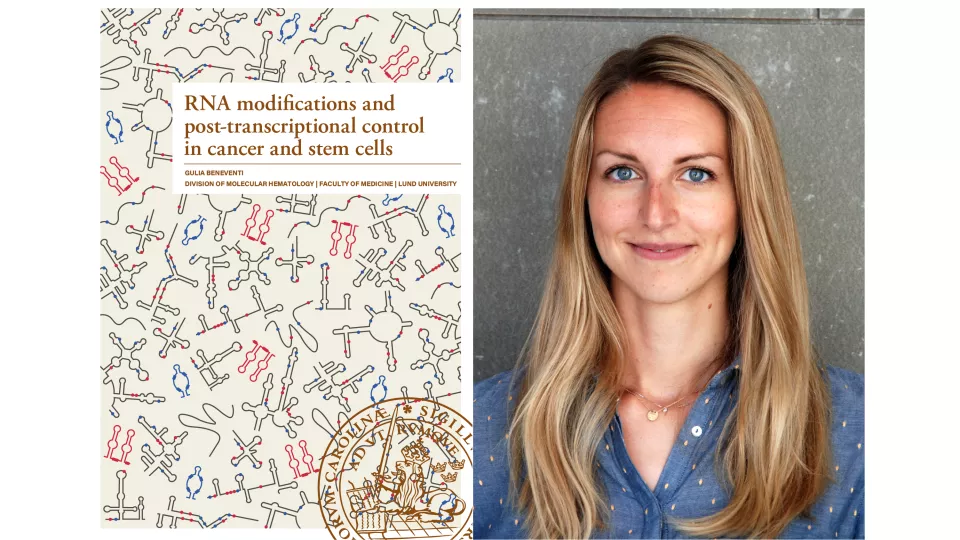What have you been working with during your PhD studies?
The main aim of my PhD project was to unravel post-transcriptional mechanisms that affect gene expression in cancer and stem cells with a specific focus on RNA modifications in splicing and translation. I have mostly worked with spliceosomal and ribosomal RNA modifications, such as pseudouridine and 2’-O-methylation. These are both well-known modifications, but dynamic changes of these in cancer and stem cells had not been very well explored when I started.
A big part of my PhD research was focused on splicing. In the first paper, we found a modification of spliceosomal RNA which is important for the splicing of genes involved in maintaining growth and survival of cancer cells. We saw that the loss of this modification leads to differential expression of chromatin remodellers, p53-related genes and affects cancer properties of cells like anchorage-independent growth and response to oxidative stress.
In the second paper, we were trying to understand the role of splicing factors abundance in cancer and find a connection between splicing and translational programs. We showed that one of the splicing factors, SF3A3, is translationally upregulated during oncogenic stress and regulates splicing events essential for cell metabolism. We also saw that the levels of SF3A3 are important for breast cancer tumorigenesis in vivo and for the switch of cancer cells from the proliferative to more stem cell like phenotype. Finally, we could associate SF3A3 levels with the probability of early or late relapse of breast cancer patients.
Another part of my thesis was focused on translation and ribosomal RNA modifications. In the third manuscript, we investigated the role of RNA pseudouridylation in hematopoiesis in vivo. We saw that depletion of one the components responsible for driving this modification causes reduction of the reconstitution capacity of hematopoietic stem cells and bone marrow cellularity. Additionally, we showed that the loss of this ribosomal RNA modification leads to deregulation of cellular growth and proliferation in vitro but the exact mechanism behind this needs to be discovered.
In the last study, we identified ribosomal RNA modification which is developmentally regulated. This modification is upregulated during differentiation of human embryonic stem cells and is important for endoderm lineage specification. Interestingly, its loss does not change global translation levels but impacts specific properties of the ribosome which might affect translation of select mRNAs. However, this effect has to be investigated further.
Can you tell us more about the cover page of your thesis?
I got inspired, came up with an idea and designed it together with my husband, Filippo. It represents all of the different RNA types that are in the cells – non-coding and coding RNAs which are modified with pseudouridine and 2’-O-methylation (blue and red dots). I also included snoRNAs, in red and blue, which are responsible for guiding both of the modifications. I am actually very proud I managed to do some kind of artistic project I am usually not the best at that.
How did you end up doing PhD in the Bellodi group?
The first time I met Cristian, my supervisor, was back in Italy, at University of Modena, where we both did our Master’s degree. Cristian was invited to give a talk, we got a chance to chat and he told me he is going to launch his own group in Lund. When he started recruiting people, I sent an application, got accepted and this is how everything begun.
Do you remember your first days in the lab?
I do not know if I remember exactly the first days but I do remember we were only three people in the lab at that time – Cristian, Tess and me. I was really excited but had no idea how to do things. In the very beginning, though, Cristian was always working in the lab, asking a lot of questions and teaching us a lot.
What has been the most challenging aspect of your PhD?
One of the main challenges was to begin my scientific career in a lab which was also just starting. We had to establish all the protocols, buy all the equipment and figure out how to do many things we have never done before. That was hard but I grew a lot while the lab was growing.
Another thing which was quite difficult for me was to learn how to deal with failure, which I am still probably not as good at as I would like to be, and to understand that when an experiment was failing it was not my personal failure. I just had to sit down, calm down and find a solution to solve the problem.
What have you enjoyed the most during your PhD?
Definitely the people I worked with. We always had a very nice, helpful and collaborative environment in our lab and department. I had a lot of fun with all of them and they really helped me when I was in difficult situations, had low moments by being always able to make me laugh.
What are your future plans?
I have known for few years now that I do not want to continue with academic career and doing a postdoc. I really appreciate people who choose to do it but I do not think it is a way to go for me. I will stay in Sweden for few more years and will try to find a job in one of the biotech or pharma companies that are located in the area of Lund, Malmö and Copenhagen.


